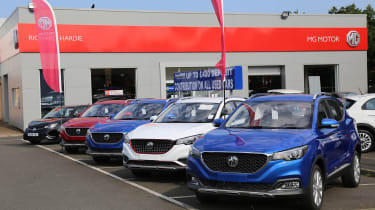How to avoid car depreciation
Our guide to car depreciation gives you the lowdown on how to minimise this inevitable aspect of new or used car ownership

Most car buyers don’t expect to keep their car for more than a few years. In fact, since an overwhelming majority of new car customers use finance packages, which tend to last between two and four years, very few keep their car for a long time.
That means most of us will have to deal with depreciation at some point – whether that’s selling a privately-bought car at a loss, or paying for it indirectly through inflated monthly payments over the course of driving the car for a few years.
The value of all cars changes over time. For most models it goes down, in that the car is worth less as time goes on. There are cases of some rarer models that rise in value, often because they’re made in limited numbers, but these are few and far between.
Depreciation is defined as the difference between what you paid for a car and what it’s worth when you sell it on. The value of your car on the used market is referred to its residual value.

Cars lose the most money in their first three years. After that time, the rate of depreciation often slows down, so a car that’s more than three years old can often be a good used buy. There are some ways to prevent rampant depreciation, though; it’s almost inevitable that your car will lose value, but there are things you can do to limit the financial hit.
Depreciation factors
If you’re thinking of buying a new car, it’s sensible to do some research into residual values – although do bear in mind that the slowest-depreciating cars are often more expensive to buy than their faster-depreciating counterparts.
Aside from the make and model of car, mileage is also a big factor in determining a car’s used value. High-mileage cars can be worth thousands of pounds less than the same model with below-average miles on the clock. It’s worth mentioning, however, that a car with unusually low mileage may have been used so infrequently that it’s likely to have problems later in its life. That fact often doesn’t deter buyers, though.
Your car’s condition will also have an impact on what it’s worth. Buyers tend to be put off by car-park dings, tatty interiors and scuffed alloy wheels, so taking care of your car and keeping it clean can pay dividends when it’s time to trade in. Cars that have a whiff of pet odour or cigarette smoke are also likely to be worth less on the used market.
Generally speaking, buyers like models with good fuel economy, so these tend to be worth more on the second-hand market. The same is true for road tax: there are a lot of otherwise excellent cars languishing on dealer forecourts, because they were built before road-tax rates became based on vehicle emissions. Many buyers are averse to purchasing a car with a high annual road-tax bill – especially if it’s only worth a few thousand pounds.

If you’re thinking of buying a car that’s about to be replaced, this is likely to have a negative impact on its used value, too. That said, manufacturers’ are often keen to do good deals on these models, which can negate anything you might lose when the time comes to sell. It’s worth doing some sums to see whether this would be a good option for you.
It can also be worth seeking out special edition models, as desirable extra kit like leather upholstery and sat-nav can boost a model's residual value. They’re often rarer, too, and only an already sought-after car, can work wonders for the car’s appeal.
Keeping your car depreciation rate low
As outlined above, choosing the right car in the first place and keeping it in good condition are the easiest things you can do to help ensure it retains the most value. It goes without saying that cars should be serviced on time, but make sure you keep all your receipts, invoices and details of any work carried out, as a full service history can also help with used values.
Our list of the slowest depreciating cars on sale today details the top 10 cars with the best residual values.
For more help on buying a car, check out our guide on when to buy a car, how to buy a car and how to negotiate a car price.
Most Popular

New Smart #5 Brabus is a 637bhp far cry from the brand’s city car past

Best car leasing deals 2025: this week’s top PCH offers
Tips & advice

Car dashboard warning lights: what does each symbol mean?

Electric car charging stations: public networks, charger types, apps and maps








